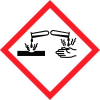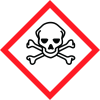Lithium hydroxide monohydrate
Sigma-Aldrich Chemie GmbH
Revision date : 2023-02-24


General Information
Revision date
2023-02-24
Product name
Lithium hydroxide monohydrate
CAS No.
1310-66-3
REACH No
is
Emergency telephone
0800 181 7059 (CHEMTREC Deutschland
Icons in SDS
Company Information
Company name
Sigma-Aldrich Chemie GmbH
E-mail address of the competent person responsible for the Safety Data Sheet
technischerservice@merckgroup.com
GHS Information
Signal word
Danger
Hazard Codes
Hazard statements (CLP)
H301, H314, H318
Hazard statements
Code
Statements
H301
Toxic if swallowed
H314
Causes severe skin burns and eye damage
H318
Causes serious eye damage
Precautionary statements
Code
Statements
P260
Do not breathe dust/fume/gas/mist/vapors/spray.
P270
Do not eat, drink or smoke when using this product.
P280
Wear protective gloves/protective clothing/eye protection/face protection.
P303+P361+P353
IF ON SKIN (or hair): Take off Immediately all contaminated clothing. Rinse SKIN with water [or shower].
P305+P351+P338
IF IN EYES: Rinse cautiously with water for several minutes. Remove contact lenses if present and easy to do - continue rinsing.
Section 2
CLP CLASSIFICATION
Acute toxicity, Oral (Category 3), H301 Skin corrosion (Sub-category 1B), H314 Serious eye damage (Category 1), H318 For the full text of the H-Statements mentioned in this Section, see Section 16.
2.2 Label elements
Labelling according Regulation (EC) No 1272/2008
Signal word
Danger
Hazard statements
H301 Toxic if swallowed. H314 Causes severe skin burns and eye damage.
Precautionary statements
P260 Do not breathe dusts or mists. P270 Do not eat, drink or smoke when using this product. P280 Wear protective gloves/ protective clothing/ eye protection/ face protection. P303 + P361 + P353 IF ON SKIN (or hair): Take off immediately all contaminated clothing. Rinse skin with water. P304 + P340 + P310 IF INHALED: Remove person to fresh air and keep comfortable for breathing. Immediately call a POISON CENTER/ doctor. P305 + P351 + P338 IF IN EYES: Rinse cautiously with water for several minutes. Remove contact lenses, if present and easy to do. Continue rinsing.
Supplemental label elements
none
2.3 Other hazards
This substance/mixture contains no components considered to be either persistent, bioaccumulative and toxic (PBT), or very persistent and very bioaccumulative (vPvB) at levels of 0.1% or higher.

